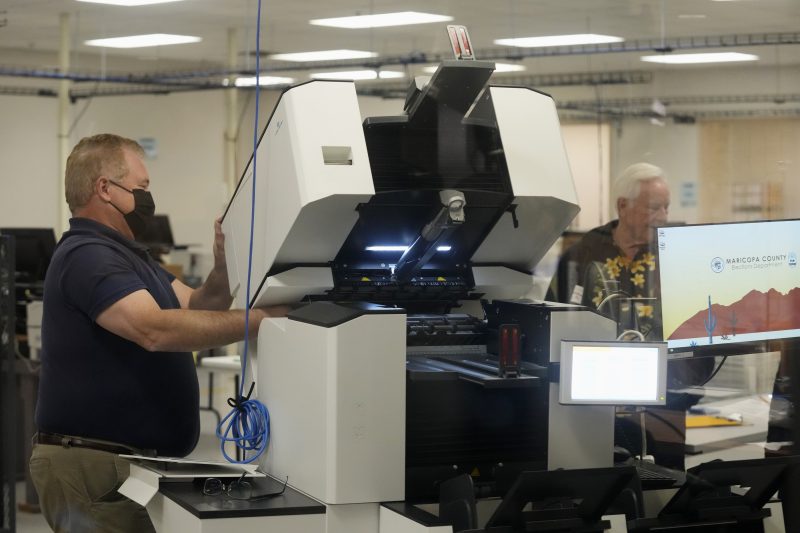PHOENIX — The combination of heavier paper and longer ballots was responsible for problems tabulating votes at dozens of polling places in Maricopa County, Ariz., during last November’s midterm elections, according to a report released Monday.
The report was prepared by a former chief justice of the Arizona Supreme Court, Ruth McGregor, who was tapped by the Maricopa County Attorney’s Office to conduct an independent review of why some of the Oki B432 printers that had performed effectively during an earlier August primary then malfunctioned several months later. McGregor retained election experts for her months-long probe.
McGregor emphasized in an introduction to the nearly 40-page document that her review was “independent and free of any outside influence.”
The report was discussed privately at a meeting on Monday of Maricopa County’s Republican-led governing body, the board of supervisors. Its public release marks the latest chapter in the board’s quest to tamp down conspiracy theories about elections in the county, which is home to more than half the state’s voters.
The printer problems caused confusion on Election Day, as tabulators at the affected sites rejected faulty ballots. Voters were instructed to travel to another polling place or deposit their ballots in secure drawers that were later transported to a central tabulation site in downtown Phoenix.
The report stressed that problems with the printers, though they inconvenienced some voters and gained widespread attention, were not pervasive. “Two-thirds of the general election vote centers reported no issues with misprinted ballots; approximately 94 percent of election day ballots were not faulty,” McGregor wrote.
Still, the glitches fueled allegations from high-profile GOP candidates that the county had deliberately undermined in-person voting, which is favored by many Republicans. Kari Lake, the unsuccessful GOP candidate for governor who has still not conceded her race, has promoted baseless claims on social media that the county had acted “fraudulently,” adding the rallying cry “#Sabotage.” Republican Abraham Hamadeh, who lost his race for attorney general in one of the closest contests in state history, called the malfunctions a “direct attack on democracy.”
But the review found no evidence of malfeasance by county officials or contractors. Instead, decisions by election officials to use heavier and longer paper for ballots forced printers to “perform at the extreme edge of their capability, a level that could not be reliably sustained” by a large number of machines, according to the report. The heavier paper was used because of conspiracy theories about ink soaking through the paper used in previous contests, the report noted. The longer paper, it said, was used because the numerous contests up for grabs in the midterms could not fit on the typical 19-inch ballot.
In unraveling the story behind the heavier paper, McGregor’s report offered a case study of sorts in how elections in Arizona have become riddled with distrust. During the 2020 election, ink from Sharpie pens bled through the paper on some ballots, the report explained, which had no effect on the tabulation of votes but gave rise to viral hoaxes about spoiled ballots.
“Within hours of the polls closing, however, a claim went viral over social media asserting that certain ballots filled out with Sharpies could not be read by vote-scanning machines in Maricopa County, a theory colloquially known as ‘SharpieGate,’” the report stated. “Although the theory was unfounded, to allay voter concerns and prevent bleed-through in future elections, Maricopa County election officials decided to use heavier, 100-pound paper during 2021 and for the 2022 primary and general elections.”
The problems with the printers are not easy to fix because the fuser on the machines cannot be separately replaced and the manufacturer, which has withdrawn from the North and South American markets, will soon no longer manufacture machine parts, according to McGregor’s report.
The report suggested the county could either stop using the printers or return to using lighter paper. County leaders could also count all ballots at a central headquarters, where more powerful tabulation machines are used, and do away with the counting of some ballots at voting locations. If county leaders continue using the printers for elections, they should more robustly stress test the machines, the report said.
Clint Hickman, the Republican chairman of the board, said in a statement that the county will change its usage of some equipment, but he did not elaborate.
“We don’t grade our own homework and now that we have a better idea of the factors involved, we’ll make changes to best serve voters, starting with replacing some equipment,” his statement said.
Bill Gates, the GOP supervisor who served as chair during the 2022 election and faced intense criticism over the printer failures, welcomed the report.
“It shows that two things can be true at the same time: our elections team prepared well for the 2022 General Election and had every reason to trust our procedures and equipment,” he said in a statement. “And yet, we can do better knowing what we know now.”
McGregor wrote that her team was asked to determine whether the problems on Election Day stemmed from human error, procedural problems or equipment failure. “Although separating related causes is always difficult, in my judgment, the primary cause of the election day failures was equipment failure,” she wrote.
“Despite the assurances of the manufacturer, many of the Oki B432 printers were not capable of reliably printing 20-inch ballots on 100-pound paper under election-day conditions,” the report concluded.
Lou Stricklin, a spokesperson for OKI Data Americas, Inc., told The Washington Post that versions of the company’s printers, including the model used by Maricopa County last cycle, have been used for years in elections across the country “and haven’t experienced any issues up to this point.” Stricklin said he had not yet read the report.



























